On Kefalonia, Winemakers Adapt to Rising Temperatures
Climate change brings water scarcity and...

Domaine Sigalas pays special attention to the experiences it offers visitors, focused on gastronomy.
Alpha Estate in Amyndeon, Sklavou Estate in Kefalonia, and Santorini’s Argyrou Estate and Domaine Sigalas feature on the list of the world’s top 100 wineries, chosen by the influential U.S. Wine & Spirits magazine. Except the winery based in Kefalonia, home to the charming Robola grape variety and Mavrodafni, a red diamond of sorts, the rest have reached this distinction before. Our country, which to this day insists on presenting wine poured in carafes and served in the traditional taverna-style short glasses at various professional promotion events abroad, is now witnessing its international reputation reach new heights each year. However, what is the value of this distinction and how much does it help support the position of Greek wine on the international market?
“This distinction is very important, as this particular magazine is one of the most famous and well-respected in the industry, as many consumers and importers consult it for their purchases. To a certain degree, it influences trends”, notes Aris Sklavenitis, owner of Oinoscent wine bar and twice recognized as best sommelier in the country. “Greece is making powerful steps into the international wine industry and is gradually becoming a global player. The most positive, of course, is that the quality of wines produced here has also increased considerably. Fifteen years ago there were wineries that produced defective wines, in contrast to today where we study their depth and complexity in detail”, he continues, highlighting that Greece has found a way to externalize its vinicultural wealth based on its plethora of local grape varieties.
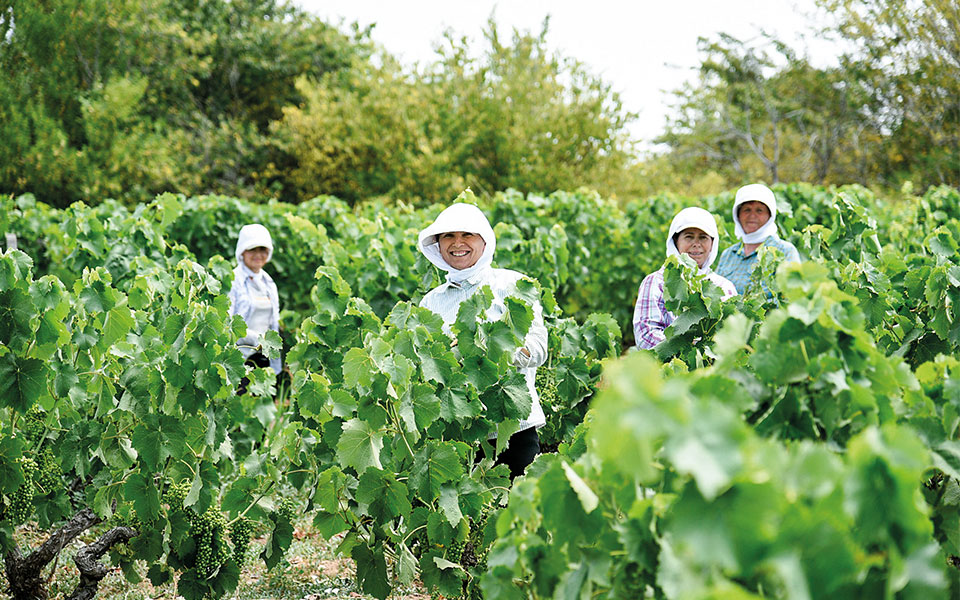
Harvest at Alpha Estate in the emblematic 100-year old Xinomavro vines, in Amyndeon.
Indeed, based on the strategic planning for the branding and marketing of Greek wines presented by the Interprofessional Organization of Vine and Wine (EDOAO), with the main goal being to increase the perceived value attributed to Greek wines compared to famous processed wines, a national dance of sorts was engaged to set up the Wines of Greece brand, featuring: Assyrtiko from Santorini, Xinomavro from Naousa and Amyndeon, Agiorgitiko from Nemea and Moschofilero from Mantinia. Gradually, the country that introduced foreigners to retsina and carafe wine, touting their authenticity, started pulling rabbits out of a hat. Malagouzia, Vidiano, Liatiko and Robola are but a few of the local varieties that are now recognized and awarded on the international market, supporting their strategic advantage of being different compared to competitors such as Chile and South Africa.
“The value image created about Greek wine is first confirmed by the approximately 5% increase in the average cost of a bottle over the past four years, and second, by its increase in popularity in more demanding markets with discerning consumers, such as France”, notes Giannis Vogiatzis, president of EDOAO, who witnessed Greek wine being abandoned by national promotion programs before the pandemic. “The wineries moved forward on their own, following the initial strategy we had planned. This is how the distinctions followed, which only further supports this new image of Greek wines”, he concludes, noting that now, the basic priority is to utilize European funds to further promote the Wines of Greece.
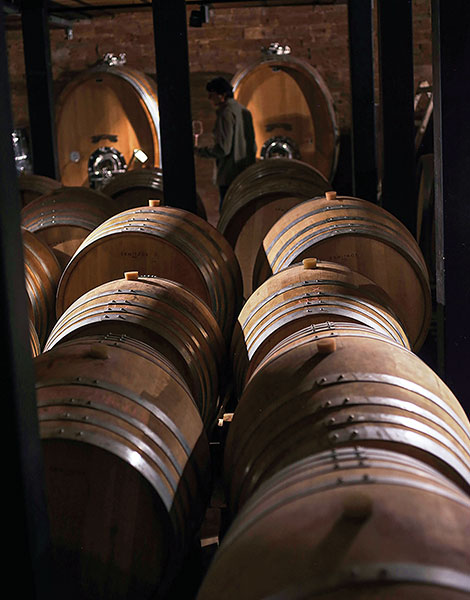
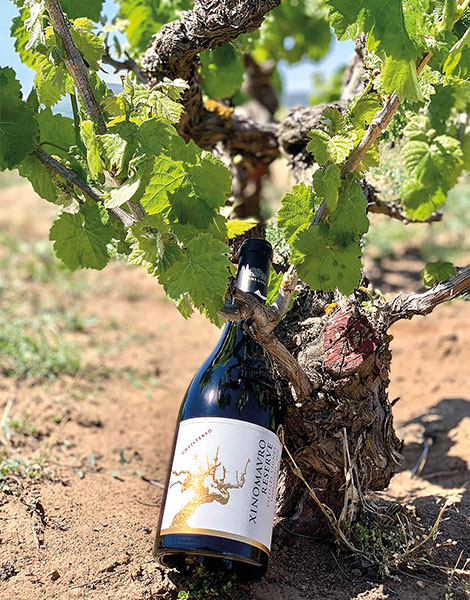
The pride of the Alpha Estate; Xinomavro 100% from vines planted in 1919.
During the 8 years from 2010 to 2018, the number of wineries in Greece doubled, from 635 to 1290. This impressive increase, given that our country was in a long period of recession, was crucial in gradually developing wine tourism. Together with its authenticity and innovation, these differentiating factors were actually what had been chosen in the initial strategic planning sessions. Due to this impressive increase in wineries, in collaboration with the Ministry of Tourism, EDOAO published the “Winery to Visit” certification in 2014, which was renewed in 2018 and parameters updated, so that the legal framework would be in place to transform wineries into wine tourism hubs.
“The majority of wineries consist of spaces and facilities that are open to the public, some boasting exceptional architecture. However, this activity in the tourism sector is unconnected with wine making, as the logic “a visitor is here, let’s offer them a glass of wine” is not really effective. We are lacking in education to offer comprehensive experiences to travelers, that include guided tours, accommodation and food”, highlights Mr. Vogiatzis, estimating that getting as many wineries as possible certified is crucial.
In fact, this lack in necessary training and education has been identified by the Ministry of Tourism, and according to Deputy Minister Sofia Zacharaki, “we plan face to face seminars with an emphasis on specialized forms of tourism, such as wine tourism, aimed at professionals and business people”. The growth of wine tourism in Greece, as a dynamic activity growing internationally, is expected to bolster the “Greek wine” brand and enrich our country’s tourism profile, as many regions previously disregarded will come to the forefront as prime wine-producing areas. This explains the high priority given to this matter by the relevant ministry as it promotes a series of relevant initiatives, such as the upgrading of the certification mentioned above, the formation of a National Wine Tourism Council for the strategic planning of this sector, and the constant updating of the website created for Greek wineries, which includes a virtual map and a detailed list of the wineries accepting visitors.

The next major project for Alpha Estate is the creation of 30-40 different expressions of the Xinomavro variety.
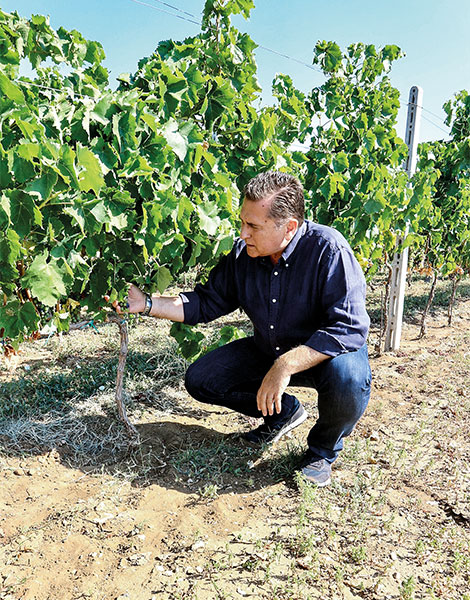
Angelos Iatridis
Angelos Iatridis Alpha Estate
«Our goal is collective visits to Amyndeon”
Distinctions recognizing Greek wine producers and showing faith in the abilities of famous Greek wines create a promise for the future. Of course, so that Greek wine continues to develop even more we ought to invest in our vineyards – not just financially, but also in human resources and infrastructure. Here at Alpha Estate we have focused on creating a modern vineyard, setting in place the conditions to produce special luxury wines.
We are implementing a gradual restructuring by planting new pure strands of Xinomavro and Malagouzia, and other varieties as well, in order to enhance our production, both formally and in quality. At the same time, in collaboration with the Viticulture lab of the Faculty of Agriculture of the Aristotle University of Thessaloniki, we are analyzing the wine region of the Amyndeon Ecosystem with the ultimate goal of determining the subzones of the Xinomavro grape variety. Thus, we will be able to create a pluralism in the production of small-scale wines, from different vines, in a way “introducing” the wine-loving public to this exceptional variety through 30-40 different expressions.
In addition, we are designing a recycling-circular economy unit where we will process the by-products of wine production, in order to return them to the vines as products for soil improvement. Today, the Alpha Estate is a meeting point for enophiles, and in 2019 we recorded 19,000 visitors, the highest number to date. A mutual effort by all wineries in the region would lead to collective tours across the entire wine-producing areas of Amyndeon, which will significantly increase the region’s touristic profile.
Identity
Info: 2nd Km Amyndeon – St. Panteleimon, Amyndeon, Τel. (+30) 23860.201.11, alpha-estate.com
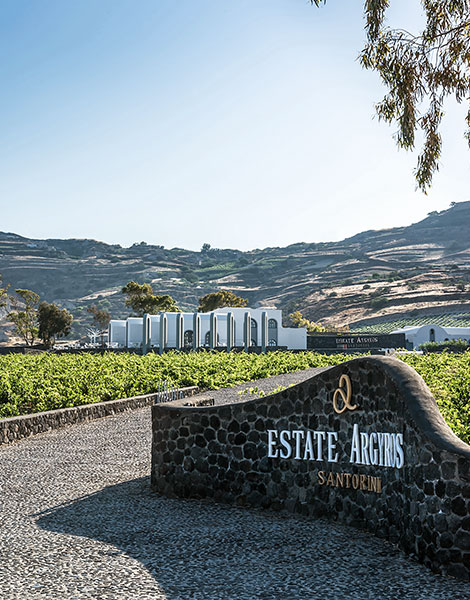
Estate Argyros
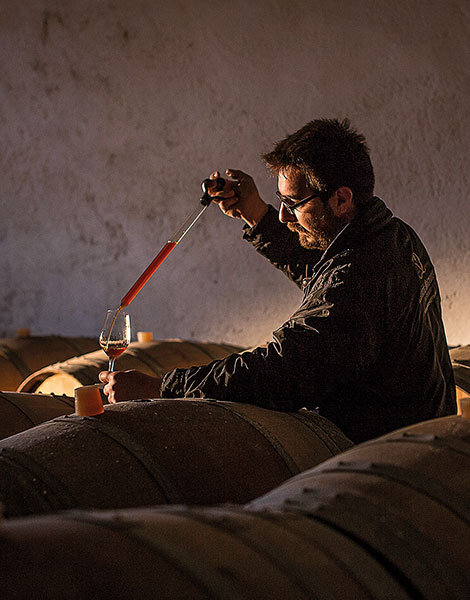
Matthaios Argyros
Matthaios Argyros, Estate Argyros
«Creating new winery teams is crucial»
This year’s distinction by the Wine & Spirits magazine, which we received in 2005, 2006, 2013, 2014, 2018 and 2019, is particularly important, not only for promoting our own vineyard, but generally is a positive development for the international promotion of Greek wine. Without a doubt, every award contributes to strengthening the image of Greek wine. And it may be that Assyrtiko opened the doors to the international market and may help considerably in securing a foothold in demanding markets, but Greek wine could not develop based on a single variety. For us, exporters for over 30 years, the creation of teams of wineries is crucial. No matter how good your wine is, importers usually search for a comprehensive portfolio to place an order. Good quality wines with the potential to grow support one another, and strengthen the country’s wine-producing profile.
Unregulated building and construction in Santorini causes considerable problems, as land with vines is used to build hotels. Of course, I think that the remaining 10,000 square meter expanse is not under threat as the situation has stabilized. Yet the irrational development of wine production remains a big problem. In other countries, possessing an expanse of land is a prerequisite to owning a winery. In Greece many times the opposite is true, with wineries actually being forced to buy grapes. Our primary ingredient is everything; while you can source grapes, ensuring their quality is more challenging. That is why the wineries that grow and develop are the ones that systematically invest in their vineyard and in collaboration. Group efforts are necessary.
Identity
Info: Episkopi Gonia Thira, Santorini, tel. (+30) 22860.314.89, estateargyros.com
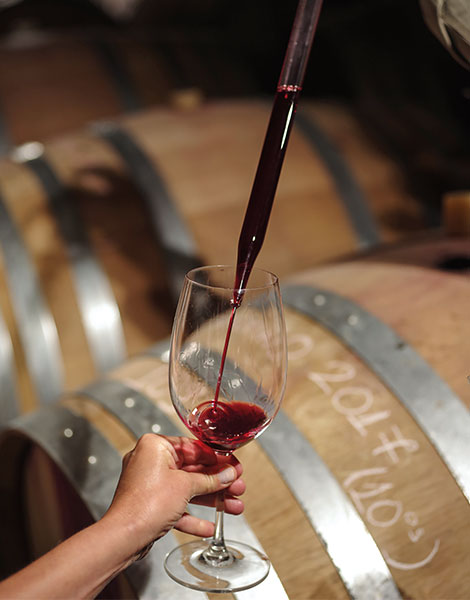
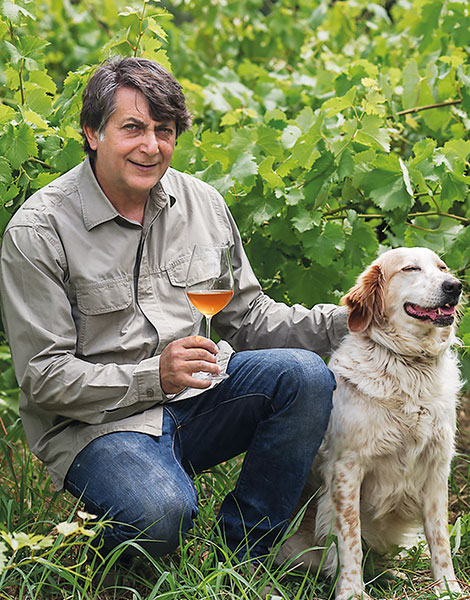
The rise of Greek wines is confirmed by the inclusion of Sclavos Wines in Kefalonia on the list of the world’s best wineries.
© Giorgos Kaplanidis, Alexandros Avramidis
Evridiades Sclavos, Sclavos Wines
«We bank on authenticity and distinctness”
This is our first time on this particular list, so this distinction for us and Kefalonia, an island with increasing wine producing potential and more than 30 local varieties, is particularly important. Of course, it is the result of 30 years systematic work in the vineyards, which has started to pay off. In fact, with the creation of the Kefalonia Winemakers Association, we are gradually bringing P.D.O. varieties to the forefront, such as the up and coming Robola, Mavrodafni and Moschato. Indeed, much like all natural organic wines, our wines demand rather particular palates, yet are nevertheless winning over the public.
Even though we have been exporting for more than 30 years, on the island we are not widely known, there is still limited connection between local wines and restaurants-tavernas. It is actually more likely that we feature on a wine list because a foreigner suggested or requested it, rather than because the owner prefers us. In general, the potential of Greek wine is based on authenticity and distinctness. It is these two elements that we need to bank on to increase our share of the international market and improve our image. Of course, it is extremely helpful that after the last 15 years, when the vineyards developed, we can now notice an upgrade in quality. We are capable of producing truly unique wines that will stand out in a few years; what we need is organized promotion from the state, so that we can make an even greater impression.
Identity
Info: Lixouri, Kefalonia, tel. (+30) 26710.922.15, sclavoswines.gr

Kir-Yianni Estate & Domaine Sigalas
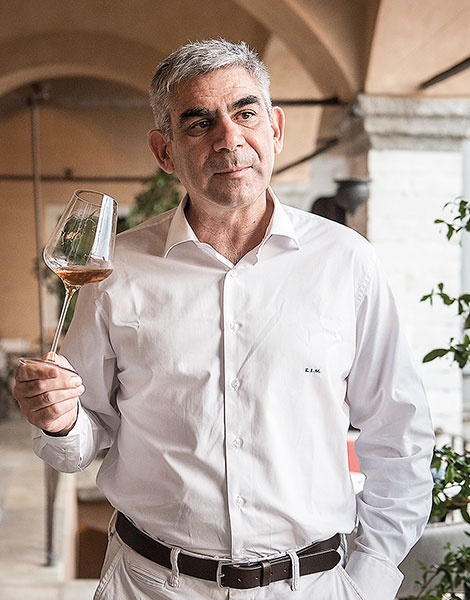
Stellios Boutaris
Stellios Boutaris, Kir-Yianni Estate & Domaine Sigalas
«Wineries as part of the local community».
The value of this particular distinction, despite its mostly advertorial character, cannot be questioned, and especially for Greek wine that is in need of looking outward. The most important part of this award is the event that follows, where Greek winemakers have the opportunity to mingle with many people, colleagues and specialized consumers. By combining local varieties with the momentum of new wineries and their modern scientific certifications, Greek wine can be promoted as a very special product through these distinctions. Of course, restaurants have also contributed considerably to this, as they are gradually being trained and include us in their lists, both domestically and abroad. The work from individuals in the food and wine pairing industry has showcased some Greek wines as a “must” for quite a few sommeliers.
The basic challenge for the country, in addition to the small number of P.D.O wines that weakens the narrative of quality wine, is that it still does not possess a “critical” mass. For instance Austria, a country of a similar size as Greece, has a few thousand wineries. Small wine producers work in their wine cellar and sell their product to tourists, thus creating many wine “neighborhoods”. For us, it is crucial that wineries become an integral part of the community; which is why we pay special attention to the spaces open to the public and to the experiences that we offer, with the island of Santorini in the forefront. Every time a new guest is pleased by the hospitality, the service on offer and, of course, the product, they automatically become a “brand ambassador”. Upon returning to their country, they will search you out again – and even better, introduce you to their friends.
Identity
Ιnfo: Baxes, Oia, Santorini, tel. (+30) 22860.716.44, sigalas-wine.com
Climate change brings water scarcity and...
Discover Greece’s winemaking heritage with tastings,...
This storied rarity, grown nearly exclusively...
Why not try a brief getaway...